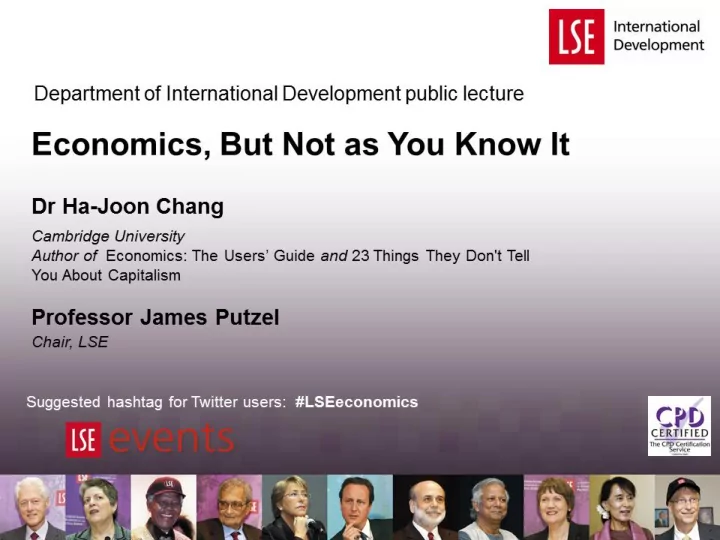

Economics – but not as you know it Ha-Joon Chang Faculty of Economics & Centre of Development Studies University of Cambridge Website: www.hajoonchang.net
So, what is different about this book? I • Nothing that cannot be understood by someone with a secondary education (Hopefully, a lot easier to read than the first ever Pelican paperback, George Bernard Shaw’s The Intelligent Woman’s Guide to Socialism, Capitalism, Sovietism and Fascism )
Table of Contents • PROLOGUE . Why Bother?: Why do you need to learn economics? • INTERLUDE I : How to read this book • PART I . Getting used to it • Chapter 1. Life, The Universe, and Everything: What is economics? • Chapter 2. From Pin to PIN: Capitalism 1776 and 2014 • Chapter 3. How have we got here?: A brief history of capitalism • Chapter 4. Let a hundred flowers bloom: How to ‘do’ economics • Chapter 5. Dramatis Personae: Who are the economic actors? • INTERLUDE II : Moving on … • PART II . Using it • Chapter 6. How many do you want it to be?: Output, income, and happiness • Chapter 7. How does your garden grow?: The world of production • Chapter 8. Trouble at the Fidelity Fiduciary Bank: Finance • Chapter 9. Boris’s goat should drop dead: Inequality and poverty • Chapter 10. I’ve known a few people who’ve worked: Work and unemployment • Chapter 11. Leviathan or the Philosopher King?: The role of the state • Chapter 12. ‘All things in prolific abundance’: The international dimension • EPILOGUE . What now?: How can we use economics to make our economy better?
So, what is different about this book? II • Neglected topics: – What is economics? – History of capitalism – Different schools of economics – Production – Work • Emphasis on ‘real life numbers’ – But with due scepticism – “ Everything factual is already a theory. ” (Johann Wolfgang von Goethe)
What is economics? I • Economics is supposed to be about ….
What is economics? II • Really, it is supposed to explain ‘Life, the Universe (or at least the World), and (almost) Everything’.
What is economics? III • The standard definition: Economics is “ the science which studies human behaviour as a relationship between ends and scarce means which have alternative uses ” (Lionel Robbins, An Essay on the Nature and Significance of Economic Science . 1932) – So, there is only one way to do economics – that is, rational choice theory • But, economics should be defined not in terms of its methodology, or theoretical approach, but in terms of its subject matter, that is, the economy (money, jobs, transfers, consumption, production). – If you follow this definition, there are many different ways of studying economics (biology vs. economics).
Many Different Schools of Economics • At least nine major schools of economics – Classical – Neoclassical – Marxist – Keynesian – Schumpeterian (neo-Schumpeterian) – Austrian – Institutionalist (Old and New) – Behaviouralist – Developmentalist • Several smaller schools – Neo-Ricardian, Latin American Structuralist, Evolutionary, Feminist, Ecological
We need diverse approaches to economics. - ‘The Singapore Problem’ or “ Life is Stranger than Fiction. ”
Let a hundred flowers bloom • There isn’t just one right way of doing economics but there are many schools of economics, each with its own strengths and weaknesses. • No theory, in economics or elsewhere, can explain everything, so we need to let a hundred flowers bloom . • However, recognising that there are different approaches is not enough. • The diversity needs to be preserved, or even encouraged . – Especially in the longer run, a discipline that contains a variety of approaches can cope with a changing world better than one with a single approach.
Let a hundred flowers cross-fertilise • I would go one step further and argue that we shouldn’t just let a hundred flowers bloom but need to have them cross-fertilised . • Different approaches to economics can actually benefit a lot from learning from each other, making our understanding of the economic world richer. – Even between schools that we think – and, more importantly, most of the members of the schools think – are incompatible with each other (e.g., Austrians-Marxists on technology, Keynesians-Austrians on uncertainty). • Don’t be a ‘ man (or a woman) with a hammer ’ – Get a Swiss army knife! (and the sense to judge which one to use)
What to do? • Never trust an economist (and that includes me!) – The willingness to challenge professional economists – and other experts – should be a foundation of democracy. • “ Audite et alteram partem ” (Listen even to the other side) – The need for humility and an open mind • “Pessimism of the intellect, optimism of the will” – Changes are difficult to make, but even big ones are possible, if you try hard enough and long enough. – “It always seems impossible until it is done.” (Nelson Mandela)
Recommend
More recommend